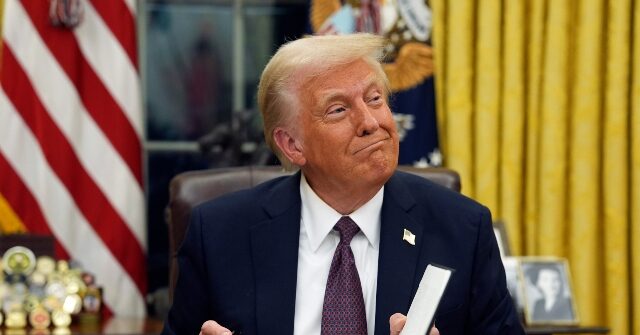Shortly after delivering his inauguration address on Monday, President Donald Trump said 25-percent tariffs on goods from Canada and Mexico could be imposed as soon as February 1.
“We are thinking in terms of 25% on Mexico and Canada, because they are allowing vast numbers of people — Canada is a very bad abuser also – vast numbers of people to come in and fentanyl to come in,” Trump told reporters from the Oval Office on Monday evening.
“I think we’ll do it February 1,” Trump responded when a reporter asked for the timing on these tariffs.
Trump later said he would consider putting a “universal tariff” on “anybody doing business in the United States” if “they’re stealing our wealth, they’re stealing our jobs, they’re stealing our companies, they’re hurting our companies.”
Trump’s comments clearly surprised the Canadian government, whose officials and political leaders have been talking tough about fighting a trade war with Trump – especially the candidates jockeying to replace departing Prime Minister Justin Trudeau – even as they evidently believed the tariff threat had subsided.
Canada’s Globe and Mail noted that U.S. media coverage on Monday suggested Trump would “direct government agencies to remedy persistent trade deficits and ensure trade deals prioritize U.S. jobs,” but he had largely stopped talking about tariffs – until he suddenly started talking about them again during his freewheeling post-inauguration press conference.
“It would be a mistake for the American government to proceed with imposing tariffs. It would be a mistake in terms of the cost of living in the United States, in terms of jobs in the United States, the security of supply chains,” Canadian Finance Minister Dominic LeBlanc said in response to Trump’s comments.
“This is an important moment for Canadians. We need to continue to fight for our interests, to defend jobs across the country, and we’re calling every single political leader across the board, across the country, to stand united, because now, more than ever, we need to make sure that we put country first,” said Foreign Minister Melanie Joly.
Trudeau’s outgoing cabinet, which has about two months on the clock before the prime minister’s “caretaker” status ends and the process of electing his successor begins, scheduled a two-day policy retreat near Ottawa to coincide with Trump’s inauguration. The retreat apparently became a bit more lively after the newly sworn-in U.S. president casually remarked that 25 percent tariffs were still on the table.
On the other hand, the UK Guardian noted that global stock markets were “largely calm” after Trump’s inauguration and tariff remarks. The Nasdaq did not budge, the S&P 500 ticked upward a mere 0.4 percent, and the dollar rallied to hit a five-year high against Canadian currency, whereas it would have been expected to fall amid tariff panic. Asian markets reacted about the same as the S&P 500, while European markets dipped less than half a percent.
“More oil production, no indication of crypto mining, punitive tariffs against Mexico and Canada: these are the three key points for investors from Trump’s inaugural address,” CMC Markets chief analyst Jochen Stanzi told the Guardian.
“We can only hope that Trump will spare the EU and Germany from punitive tariffs until after the German parliamentary elections, as the outgoing government will hardly be in a position to react to changes in trade relations with the US. However, this reprieve should not be taken as permanent. Sooner or later, Trump will also target Germany,” Stanzi added.
On Tuesday, CNBC saw stocks rising as “Wall Street viewed President Trump’s comments and first-day actions around international trade as a bit softer than initially believed.”
That sounds like a rather different perspective than the view from Ottawa on Monday night, but CNBC noted that Trump talked about tariffs without actually “authorizing new levies on his first day back in the Oval Office.”
Goldman Sachs economist Alex Phillips told clients that Trump’s “language around Canada and Mexico was actually more hawkish than he anticipated,” but his “policy announcements on tariffs were more benign than expected.”
From this contrast, Phillips concluded that despite talking about dropping 25 percent tariffs on Canada and Mexico in less than two weeks when he was sparring with reporters, Trump may regard those tariffs as “a lower priority than we would have expected.”
Read the full article here


